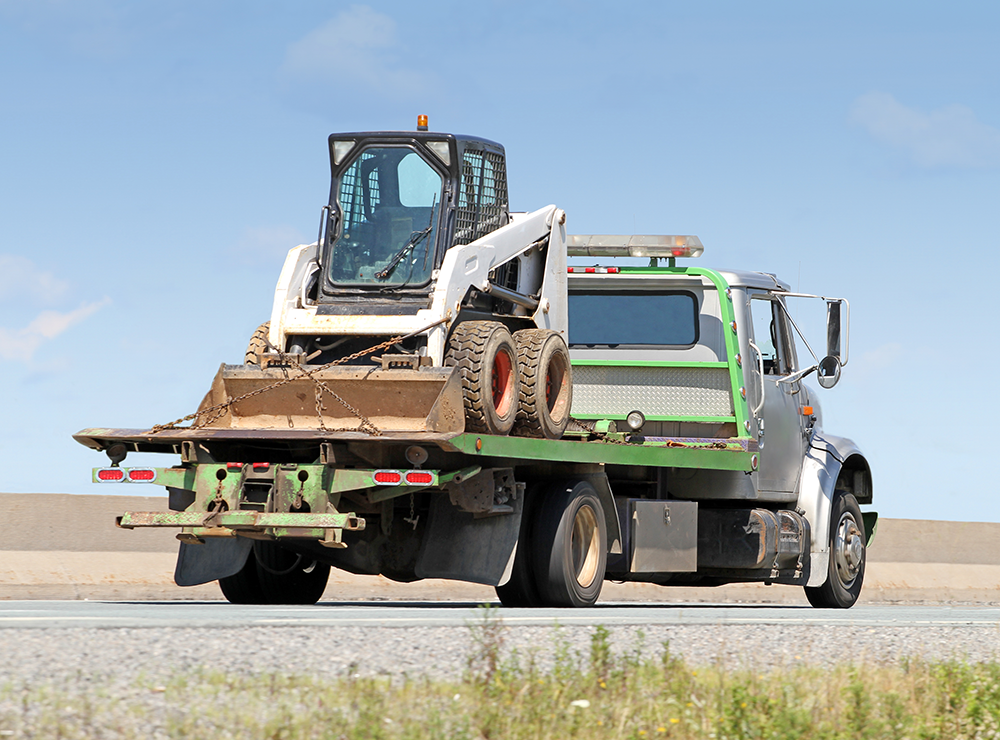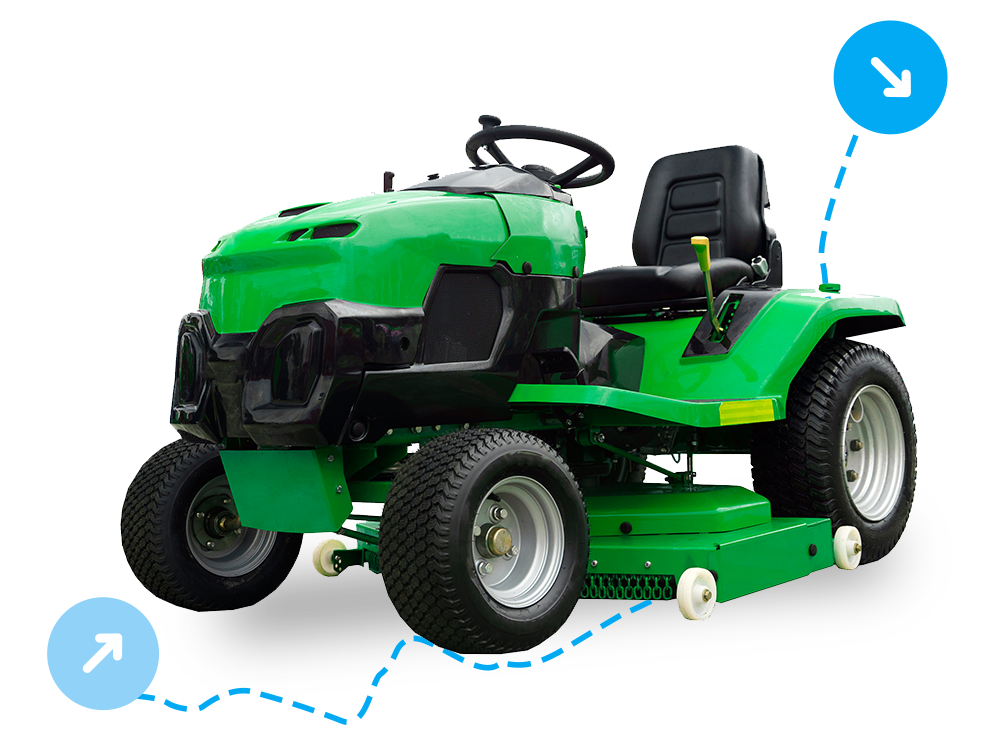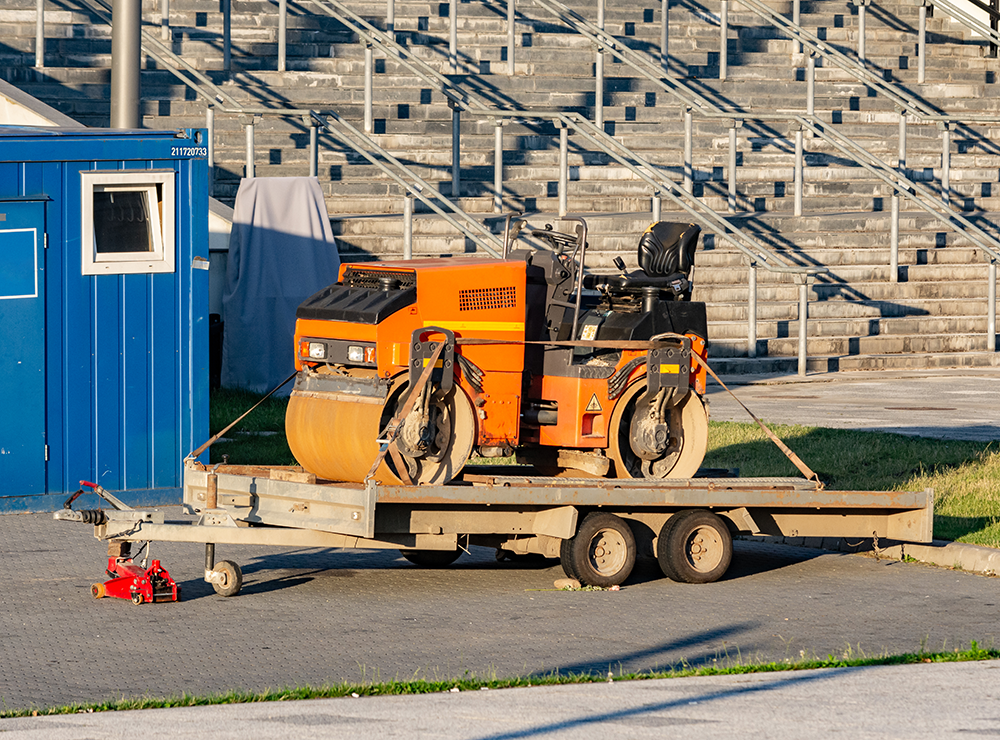
Small Equipment Shipping in the US — A Comprehensive Guide
What You Need to Know for Shipping Your Machinery
Get Small Equipment Shipping Quotes Today 35,000 Active Carriers
35,000 Active Carriers Transparent Pricing
Transparent Pricing User-Friendly Platform
User-Friendly Platform Secure Payments
Secure PaymentsWhat is Small Equipment Shipping?
Many consider “small equipment” to be anything smaller than a crane or a large bulldozer, and for that reason, the category can be misleading. Small equipment shipping is an essential service for a wide range of individuals and businesses, including landscapers, construction companies, equipment dealers, and hobbyists who need to transport their specialized machinery. Unlike standard vehicles, these items are often heavy and uniquely shaped and may require specialized transport equipment and sometimes permits to ensure they arrive safely at their destination. Moving small equipment isn't as simple as shipping a parcel; proper planning, professional expertise, and compliance with legal regulations are all critical to a successful shipment.
Why Small Equipment Shipping Services Are Needed
Farmers frequently require tractor shipping services when purchasing new equipment from out-of-state dealers, relocating to a new farm, or sending machinery for repair. Construction companies rely on professional transport services to move heavy machinery between job sites efficiently. Equipment dealers, rental companies, and auction houses also use these services to deliver tractors to buyers or return leased equipment. Even individual tractor owners may need shipping services when selling or purchasing a tractor from a distant location.
Since what's considered "small equipment" varies significantly in size, weight, and handling requirements, not all transport options are suitable for every model. Small garden tractors or compact generators may fit on standard flatbed trailers or even robust pickup trucks, while more specialized items like mini excavators or compact forklifts may require dedicated specialized transport like step-deck or lowboy trailers. Understanding the different shipping options ensures that the correct method is used to protect your equipment from damage and avoid unnecessary costs.

LOOKING FOR EXPERIENCED SMALL EQUIPMENT TRANSPORTERS?
Find Your Perfect Carrier TodayChallenges of Transporting Small Equipment
When shipping small equipment, several challenges often arise due to its unexpected size, specific handling needs, and external factors. Understanding these can help you prepare for a smoother, more secure transport:
Surprising Size and Weight: Many seemingly compact items, like mini excavators or large industrial air compressors, can exceed standard road transport limits, requiring special permits, careful route planning, and sometimes escort vehicles.
Attachments and Accessories: Small equipment often comes with attachments (buckets, plows, specialized tools) that need to be secured separately or carefully integrated into the load to prevent damage during transit.
Weather Exposure: Open transport, common for this type of equipment, leaves items exposed to rain, snow, dust, and road debris, which can be a concern for certain models or finishes.
Logistical Variables: Scheduling delays, fluctuating fuel costs, and finding an experienced carrier specializing in your specific type of equipment are common concerns for shippers.
Risks of Self-Transporting Small Equipment
Attempting to transport small equipment without professional help can result in serious safety hazards and significant financial issues. Many standard trailers and personal vehicles are simply not designed to handle the substantial weight, unique dimensions, and complex balancing requirements of even "small" machinery, drastically increasing the risk of mechanical failure for your vehicle, accidents on the road, or improper load balancing.
Furthermore, oversized equipment, even what you might consider "small," can easily exceed legal transport limits, requiring permits that individuals may not be aware of or equipped to obtain. Without proper documentation and permits, drivers risk substantial fines, significant delays, or even the impoundment of their valuable equipment. Poorly secured small equipment can easily shift during transit, leading to damage to the machinery itself, the transport vehicle, or creating dangerous road hazards for other drivers.
Given these inherent risks, hiring professionals with the right equipment, specialized trailers, and expertise is the best way to ensure a smooth, safe, and compliant shipping experience.

GET YOUR EQUIPMENT MOVING TODAY!
Carriers Are Ready!Benefits of Hiring a Professional Carrier for Small Equipment Transport
Hiring a professional carrier for your small equipment transport provides numerous advantages, ensuring your valuable assets are moved safely, efficiently, and compliantly.
Safety & Damage Prevention: Professional transport companies utilize heavy-duty trailers, high-strength tie-downs, and specialized loading techniques tailored for heavy equipment. This meticulous approach ensures that your small equipment remains secure and stable throughout transit. This significantly minimizes the risk of shifting, tipping, or damage during transportation, safeguarding your investment.
Compliance with Transport Regulations: Shipping any type of equipment, even seemingly small pieces, often involves navigating complex federal and state transportation laws. Professional carriers are well-versed in Department of Transportation (DOT) and Federal Motor Carrier Safety Administration (FMCSA) regulations. They ensure that all necessary permits are obtained, adhere to specific route planning requirements, and meet all legal mandates, preventing costly fines or delays.
Time and Cost Savings: While self-transporting small equipment might initially seem cheaper, hidden costs can quickly accumulate. These often include unexpected fuel expenses for non-commercial vehicles, potential fines for non-compliance, trailer rental fees, specialized equipment rental, and, critically, the high risk of damage to your own vehicle or the equipment itself. Professional shipping services provide an all-inclusive solution, saving you both time and money in the long run by avoiding these unforeseen expenditures and risks.
Insurance Protection: Reputable shipping companies provide cargo insurance, covering any potential damage that might occur during transit. This offers invaluable peace of mind and crucial financial protection that simply isn't available if you attempt to self-transport without specialized commercial coverage. When you use uShip, you also have the option for additional protection with our uShip Protection Plan that goes beyond typical carrier coverage.
Experienced Handling of Specialized Loads: Professional carriers possess extensive experience transporting oversized or uniquely shaped loads. This includes securing necessary escort vehicles when required and meticulously choosing the safest, most efficient routes for transport, particularly when navigating challenging terrain or specific regulations.
Choosing a professional small equipment shipping service ensures that your valuable machinery is transported legally, safely, and efficiently, effectively eliminating the many risks associated with attempting self-transport. Whether you're shipping across state lines or just a few miles down the road, hiring an experienced carrier is the best way to protect your investment and ensure a seamless delivery, and there’s no better way to find the best deal than uShip.
Understanding the Cost of Small Equipment Shipping
The cost of shipping small equipment varies widely depending on several factors, much like shipping any larger piece of machinery. Knowing what influences pricing can empower equipment owners to budget effectively and find the best shipping option for their specific needs.
Here are the key factors that influence the cost of shipping small equipment:
Distance of Transport:
As with all shipments, the farther your equipment needs to be shipped, the higher the overall cost. However, it's worth noting that per-mile rates often decrease for longer-haul shipments due to the efficiency of continuous travel.

Equipment Size and Weight:
Larger and heavier pieces of small equipment inherently require specialized equipment, such as heavier-duty trailers or more robust loading mechanisms, which increases transport costs. Additionally, if your equipment exceeds certain state-specific dimensions, additional permits may be needed for oversized loads, further adding to the expense.

Shipping Method:
The choice of transport method significantly impacts cost. Open transport, where your equipment is exposed to the elements, is typically more budget-friendly than enclosed transport, which provides extra protection from weather and road debris. Specialized services like hot shot or dedicated hauling will also influence pricing.

Seasonality and Demand:
Shipping costs can fluctuate based on supply and demand in the transportation market. Peak seasons for farming, construction, or specific industries can drive prices higher due to increased demand for shipping services during those times.

Pickup and Delivery Locations:
Transporting equipment to or from a rural or remote area may cost more due to limited carrier availability and the added logistical challenges of reaching less accessible locations. Urban areas might have different challenges like traffic congestion or restricted access for large trucks.

Fuel Prices and Route Fees:
Rising fuel costs directly impact transport rates, as carriers adjust pricing based on current fuel surcharges. Toll fees, bridge fees, and expected road expenses along the planned route also factor into the overall cost.

Expedited Shipping Needs:
If your small equipment must be delivered within a short, specific timeframe, opting for faster shipping options will inevitably cost more. Expect to pay a premium for priority or expedited transport compared to standard delivery services.


Want to find a carrier that best meets your needs, budget, and timeline?
It couldn’t be easier!
Get QuotesAverage Cost Estimates
While costs vary widely, small equipment shipping typically ranges between $2 to $7 per mile, depending heavily on the factors mentioned above. As an example:
Short-distance transport (under 200 miles): $300–$1,000
Mid-range transport (200-1,000 miles): $1,000–$3,500
Cross-country transport (1,000+ miles): $3,500–$7,000
It's important to remember that additional fees may apply for oversized load permits, escort vehicles, or extra services like enclosed transport or specialized loading assistance.

How to Get the Best Price on Small Equipment Shipping
Discovering the perfect shipping solution for your small equipment is simpler than you think. By understanding the key cost elements, you can confidently make smart decisions that ensure your equipment travels securely and efficiently. Here’s how to secure the most competitive rates:
Compare Multiple Quotes: The single most effective way to find the best rate is to review estimates from several shipping companies. uShip simplifies this by allowing multiple carriers to bid on your single listing.
Be Flexible with Pickup and Delivery Dates: Allowing carriers some flexibility with your pickup and delivery dates can significantly help secure a lower price. Carriers often provide better rates when they can fit your shipment into their existing routes, reducing "deadhead" (empty) miles.
Choose the Right Trailer Type: While flatbed transport is often more budget-friendly, choosing the right trailer type for your specific equipment is crucial. For instance, if your equipment is oversized for a standard flatbed, a step-deck or lowboy trailer might be required, which can influence the cost.
Plan Ahead: Booking your shipment in advance can help you avoid last-minute price surges that often occur during peak seasons or for urgent requests. Early planning gives carriers more time to optimize their routes and offer you better deals.
How to Get the Best Price on Small Equipment Shipping
Discovering the perfect shipping solution for your small equipment is simpler than you think. By understanding the key cost elements, you can confidently make smart decisions that ensure your equipment travels securely and efficiently. Here’s how to secure the most competitive rates:
Compare Multiple Quotes: The single most effective way to find the best rate is to review estimates from several shipping companies. uShip simplifies this by allowing multiple carriers to bid on your single listing.
Be Flexible with Pickup and Delivery Dates: Allowing carriers some flexibility with your pickup and delivery dates can significantly help secure a lower price. Carriers often provide better rates when they can fit your shipment into their existing routes, reducing "deadhead" (empty) miles.
Choose the Right Trailer Type: While flatbed transport is often more budget-friendly, choosing the right trailer type for your specific equipment is crucial. For instance, if your equipment is oversized for a standard flatbed, a step-deck or lowboy trailer might be required, which can influence the cost.
Plan Ahead: Booking your shipment in advance can help you avoid last-minute price surges that often occur during peak seasons or for urgent requests. Early planning gives carriers more time to optimize their routes and offer you better deals.

What is the Best Way to Ship Small Equipment?
Selecting the right transport method for your small equipment depends heavily on its size, weight, dimensions, and the distance it needs to travel. Here are some of the most effective ways to get it done.
Flatbed Trailer Transport
Flatbed trailers are a common and cost-effective option for shipping various "small" equipment. Their open design allows for easy loading and unloading, making them ideal for standard-sized equipment within typical height or weight limits.
- Pros: Flatbed transport is often cost-effective and widely available. Its open design makes loading and unloading straightforward.
- Cons: Since it's an open platform, your equipment will have no protection from adverse weather conditions (rain, snow, sun) or road debris during transit.
Step-Deck (Drop-Deck) Trailer Transport
Step-deck trailers, with their lower main deck, are ideal for transporting taller equipment without exceeding height limits. They offer improved vertical clearance for items with cabs or roll bars, making them suitable for machinery too tall for flatbeds but not large enough for lowboys.
- Pros: They are ideal for taller equipment, helping avoid height permit issues. They also offer good versatility for a range of machinery.
- Cons: Generally, step-deck transport is slightly more expensive than standard flatbeds due to their specialized design and slightly lower availability.
Lowboy Trailer Transport
Lowboy trailers, with their unique drop-deck design, sit exceptionally close to the ground. This makes them ideal for transporting extra-large, extremely heavy, or oversized equipment, including "small equipment" that exceeds height restrictions for other trailers.
- Pros: Unmatched capacity for handling oversized and extremely heavy loads, effectively mitigating height clearance issues and offering superior stability.
- Cons: Sometimes requires additional permits due to their specialized nature and the size of the loads they carry, and typically involves more specialized carriers, leading to higher costs.
Hotshot Transport for Small Equipment
Hotshot trucking utilizes medium-duty pickup trucks equipped with gooseneck or tilt trailers, making them ideal for smaller pieces of equipment and expedited, short-to-medium distance shipments. This method offers a balance of speed and cost-effectiveness for smaller equipment.
- Pros: Offers quick delivery due to dedicated transport, flexible scheduling, and often a lower cost for smaller, lighter loads.
- Cons: Has a limited weight capacity compared to larger semi-trailers and is not suitable for truly large or heavy equipment.
Regulations and Legal Considerations for Small Equipment Shipping
Shipping any type of equipment, including what you might classify as "small," involves navigating a complex web of federal and state regulations. These rules are designed to ensure road safety and compliance with transportation laws. Understanding these regulations beforehand is crucial for equipment owners to avoid fines, significant delays, or unforeseen legal issues.
Federal and State Transportation Laws
In the United States, the primary regulatory bodies overseeing equipment transport are the U.S. Department of Transportation (DOT) and the Federal Motor Carrier Safety Administration (FMCSA). These agencies establish critical weight, height, and width limits that all commercial carriers must adhere to.
Beyond federal guidelines, each individual state may also impose additional restrictions, such as designated travel hours for oversized loads, specific route requirements, or varying definitions of what constitutes an oversized load.
When Are Permits Required?
Tractors and other equipment that exceed standard transport limits require special permits. In most states, a load is generally considered oversized if it:
- Exceeds 8.5 feet in width
- Is taller than 13.5 to 14.5 feet (depending on state laws)
- Weighs more than 80,000 pounds when combined with the trailer
These permits must be obtained before transport commences, and for certain oversized shipments, some states may also require escort vehicles to accompany the load for added safety and visibility.
DOT and FMCSA Compliance
Professional carriers must strictly comply with a range of DOT and FMCSA regulations to operate legally and safely. These include:
- Proper load securement techniques: Ensuring all equipment is tied down correctly and safely.
- Adhering to Hours of Service (HOS) rules for drivers: Regulating how long drivers can operate to prevent fatigue.
- Following state-specific routing and permitting requirements: Especially crucial for oversized loads.
- Ensuring that vehicles meet federal safety inspection standards: Maintaining transport vehicles in optimal condition.


How to Prepare Your Small Equipment for Shipping
Proper preparation is crucial for smooth, damage-free, and timely small equipment shipping. This includes:
Measure and Document: Precisely measure length, width, height, and weight (including attachments) to ensure the correct shipping method and permits. Providing precise measurements to your carrier ensures they choose the correct trailer type and obtain any necessary permits if your equipment qualifies as an oversized load.
Secure or Remove Attachments: Detach and secure loose parts like loaders, plows, and mirrors to prevent damage during transit.
Check Fluids & Battery: Reduce fuel to 1/4 tank, secure fluid caps, and disconnect/secure the battery to prevent hazards.
Inspect Tires & Brakes: Ensure tires are properly inflated and brakes are functional for safe loading and unloading.
Take Photos: Document your equipment's condition with high-resolution photos from all angles before shipping as crucial evidence for potential damage claims.
Choosing the Right Small Equipment Shipping Company
Selecting the right shipping company for your small equipment is crucial for ensuring a smooth, cost-effective, and secure transport experience. Not all carriers possess the specialized expertise or equipment required to handle oversized or heavy machinery, so carefully vetting your options before booking is key.
Pro tip: With uShip, you can compare multiple carrier quotes side-by-side in one place. This makes it super easy to find the right carrier for your budget, timeline, and circumstances.

What to Look for in a Small Equipment Transport Carrier
A reputable and reliable carrier for your small equipment should have these key qualities:
Experience With Heavy Equipment Transport:
Not all trucking companies specialize in hauling machinery. Look specifically for carriers with a proven track record of hauling farm, construction, or industrial equipment similar to yours. Their experience translates directly into safer, more efficient transport.
Proper Licensing and Insurance:
Ensure the company is duly registered with the Department of Transportation and fully complies with Federal Motor Carrier Safety Administration regulations. They should also provide adequate cargo insurance to protect your equipment during transit. If you book with uShip, you can easily add the uShip Protection Plan at checkout for added peace of mind.
The Right Equipment:
Depending on your equipment's size and weight, a carrier should be able to offer the appropriate trailer types, such as flatbed, step-deck, or lowboy trailers, to properly accommodate your load. This ensures safe transport and compliance with size regulations.
Good Customer Service and Communication:
A reliable shipper provides clear, proactive communication, including shipment tracking updates and transparent pricing. Excellent customer service means they are responsive to your questions and concerns throughout the shipping process.
Comparing Quotes and Services
It's always a good idea to get multiple quotes to ensure you're getting a fair price for transport. However, price isn't the only factor to consider; other factors include evaluating the company's reputation, estimated transit time, and any included services. Some carriers might offer additional perks like expedited shipping, liftgate services, or enclosed transport for added protection.
Instead of individually calling dozens of carriers, uShip simplifies the process by connecting you with a broad network of equipment transporters. With uShip, you can:
- Instantly compare multiple carrier quotes in one convenient place.
- Read real customer reviews and ratings from previous shipments before making your decision.
- Choose the best price and service based on actual customer experiences and carrier capabilities.
- Easily book and track your shipment through the platform.
Using uShip effectively eliminates the guesswork often associated with finding a transporter, ensuring you're working with a qualified carrier for your specific shipping needs.

Ready to Get Started?
Get Small Equipment Shipping Quotes TodayQuestions to Ask Before Booking
Before finalizing your small equipment shipment, it's wise to ask your carrier a few key questions to ensure a smooth, stress-free experience:
- What type of trailer will be used? Confirming the exact trailer type ensures your equipment will be transported on the right vehicle.
- What permits are required? If your equipment is oversized, confirm that the carrier will obtain all necessary state-specific permits before transport.
- What insurance coverage is provided? Ask about their standard liability coverage and inquire if additional protection is needed or recommended for your specific item.
- How long will delivery take? Get an estimated timeframe for delivery and inquire about expedited options if your timeline is tight.
- What is the cancellation policy? Understand any potential penalties or fees should your plans change after booking.
Using uShip to compare carriers and verify credentials, you can confidently book small equipment transport with a trusted service provider. Taking the time to research and ask the right questions will help ensure a smooth, stress-free shipping experience.
Best Practices for a Smooth Shipping Experience
To ensure your small equipment arrives safely and on time, follow these best practices, leveraging uShip for a streamlined process:
- Plan Ahead: Book in advance on uShip to secure better rates and wider carrier availability.
- Verify Carriers: Utilize uShip's detailed profiles, reviews, and communication system to choose experienced transporters.
- Provide Accurate Details: Input precise equipment information (make, model, year, dimensions, attachments) on uShip to get accurate quotes and avoid issues.
- Understand Insurance: Review carrier coverage and consider additional protection like the uShip Protection Plan.
- Schedule Conveniently: Coordinate pickup/delivery times directly with carriers via uShip's messaging system.
- Inspect Thoroughly: Document your equipment's condition with photos before and after shipping. uShip provides dispute resolution support if needed.
Why uShip Makes Small Equipment Shipping Easy
Using uShip truly takes the guesswork out of complex equipment shipping. Instead of manually calling numerous carriers, negotiating prices, and vetting services individually, uShip's marketplace simplifies the entire process, allowing you to:
- Instantly compare multiple quotes from qualified transporters.
- Read real customer reviews and ratings before making a decision.
- Communicate directly with carriers for scheduling and updates.
- Secure payments that are only released once your equipment arrives safely.
- Ensure safe, insured transport with user-reviewed professionals.
By following these best practices and leveraging uShip's user-friendly platform, small equipment owners can eliminate much of the stress, significantly reduce costs, and ensure a seamless shipping experience from start to finish.
Conclusion & TL;DR
Shipping small equipment requires careful planning, selecting the right transport method, and partnering with experienced professionals to ensure a safe and efficient delivery. From understanding complex regulations and cost factors to properly preparing your valuable machinery, each step plays a crucial role in a smooth and successful shipping experience.
TL;DR - Key Takeaways:
- Professional transport is the safest option: Avoid the significant risks of self-transport and ensure full legal compliance.
- Shipping costs vary: Factors like distance, size, and chosen shipping method profoundly affect pricing.
- Choosing the right transport method matters: Flatbeds, step-decks, and lowboys each serve different equipment needs, so select wisely.
- Permits and regulations apply: Even "small" oversized equipment requires state-specific permits and adherence to compliance rules.
- Preparation is key: Securing attachments, checking fluid levels, and thoroughly documenting the condition are vital steps before transport.
- uShip simplifies the process: Our platform allows you to compare quotes, read reviews, and book a carrier quickly and confidently.
Using uShip ensures a hassle-free equipment shipping experience by connecting you with trusted, experienced carriers who specialize in heavy equipment transport. Whether you need local or long-distance shipping, uShip's marketplace helps you find the best option at the right price.
Ready to ship your small equipment? Get started with uShip today and find the perfect carrier for your transport needs!

Ready to Ship Your Small Equipment?
Are you ready to compare quotes side-by-side to find the best deal on your terms?
Start Getting Quotes Today


